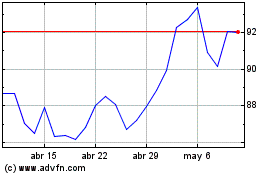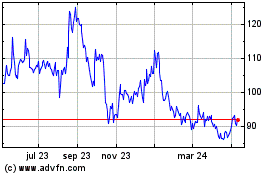European Union Approves Pfizer-BioNTech Vaccine for Adolescents
28 Mayo 2021 - 1:59PM
Noticias Dow Jones
By Eric Sylvers
The European Union's health agency approved the Covid-19 vaccine
from Pfizer Inc. and BioNTech SE for children between the ages of
12 and 15 years old, a move that will give a boost to the
continent's vaccination campaign.
The decision on Friday by the European Medicines Agency greatly
increases the pool of people in the EU who can be vaccinated at a
time when the infection rate has begun falling quickly. The U.S.
began administering the Pfizer-BioNTech vaccine to kids 12 to 15
earlier this month.
The EMA gave the green light after reviewing data from a trial
in which none of the 1,005 children who got the vaccine developed
Covid-19. Of the 978 who got the placebo, 16 got Covid. The results
were similar to those from a trial in the U.S. concluded earlier
this year.
Europe's vaccination campaign has been accelerating in recent
weeks, leading to a steep drop in infections and deaths. Daily
confirmed new cases in the EU have fallen by three-quarters since
the beginning of April, according to Our World in Data. Daily
deaths are down by almost 70%, compared with six weeks ago.
In a sign of the advancing vaccination campaign on Friday, Italy
said that beginning June 3 all people over the age of 16 can sign
up to get vaccinated.
Across the EU, about 37% of the population has received at least
one dose of a coronavirus vaccine, compared with about 50% in the
U.S. About 62% of Americans over the age of 18 have received at
least one dose.
Children in the EU trial developed a level of immunity similar
to what has been observed in people age 16 to 25, said Marco
Cavaleri, EMA's head of biological health threats and vaccines
strategy. The children showed the same side effects as those 16 and
over, including pain at the injection site, fatigue, headache,
general muscle pain and fever. The side effects are usually mild or
moderate and improve within a few days after the injection, EMA
said.
Due to the limited number of children in the trial, rare side
effects wouldn't have been detected, but the benefits of the
vaccine outweigh any potential risks, Dr. Cavaleri said. The
regulator is expecting that Moderna Inc. will soon send data from a
study carried out in adolescents for its vaccine.
The EU Commission, the bloc's executive arm, still must give its
approval. Then it will be up to the individual member countries to
decide if and when to begin giving the Pfizer-BioNTech vaccine to
12-to-15-year-olds.
While children are at lower risk of catching the virus than
adults, and when they do get infected they tend to have milder
symptoms, some do get seriously ill. Children can also spread the
virus. Vaccinating adolescents is seen as fundamental for reaching
a rate of overall immunity that could halt the spread of the
virus.
Separately, the EMA said the rare combination of thrombosis and
low blood platelets has continued to occur in about 1 in every
100,000 people who receive the AstraZeneca PLC vaccine. But the
death rate has declined, an indication that people getting the
vaccine and doctors are watching for the rare adverse reaction that
can first manifest as severe and lasting headaches or stomach
pain.
The AstraZeneca and Johnson & Johnson vaccines use a similar
technology to stimulate immunity in the body. In Europe, there has
been 1 case of thrombosis and low blood platelets among the 2.1
million people who have received the Johnson & Johnson shot.
The U.K. approved the shot on Friday.
The J&J vaccine is seen as key for vaccination campaigns
because the one-shot regime will make it easier to vaccinate
hard-to-reach groups, often living in remote areas.
Write to Eric Sylvers at eric.sylvers@wsj.com
(END) Dow Jones Newswires
May 28, 2021 14:45 ET (18:45 GMT)
Copyright (c) 2021 Dow Jones & Company, Inc.
BioNTech (NASDAQ:BNTX)
Gráfica de Acción Histórica
De Mar 2024 a Abr 2024

BioNTech (NASDAQ:BNTX)
Gráfica de Acción Histórica
De Abr 2023 a Abr 2024
